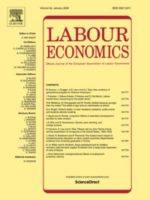Take-up and labor supply responses to disability insurance earnings limits
Judi Krekó, Dániel Prinz, Andrea Weber
Highlights
Earnings limits create a trade-off between their screening and distortionary effect.
We study a policy in Hungary that reduced the earnings limit for new DI beneficiaries.
Decrease in the earnings limit had a small impact on selection into the program.
The policy reduced labor supply on the intensive margin significantly.
Reduced labor supply is driven by beneficiaries with higher pre-disability earnings.
Abstract
In most disability insurance programs beneficiaries lose some or all of their benefits if they earn above an earnings threshold. While intended to screen out applicants with high remaining working capacity, earnings limits can also distort the labor supply of beneficiaries. We use a reduction in the earnings limit in Hungary to evaluate this trade-off and examine screening and labor supply responses. We find that the policy changed selection into the program modestly but reduced labor supply on the intensive margin significantly. These findings suggest that the earnings threshold should be higher.


